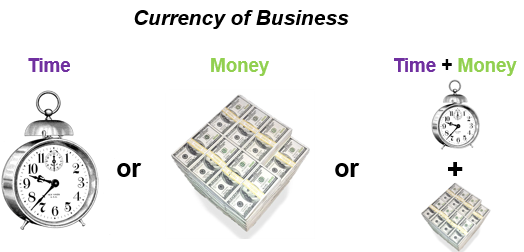
Do you ever find that you never have enough time to get done what needs to get done? Do you ever find that you never have enough money to do what you want to do when you want to do it?
If the answer is yes, yes, then you are not efficiently deploying the currency of business in your business. You are likely doing things that other people should be doing while losing money as you trip over “dollars” trying to grab those “pennies” that emerge when you do it yourself.
Pause to appreciate what your business most needs you to do and do it. That which is left needs to be delegated or stopped because you don’t have the time or money to waste on the trivial and unimportant.
Overview
Money is defined as anything which is generally accepted as a medium of exchange. The characteristics of money are acceptability, portability, divisibility, and limited supply. The functions of money are as a medium of exchange, a measure of value, the basis of credit, and purchasing power. Customer purchase orders, bank checks, credit cards, etc., are not money because they do not carry the payers’ assets. What they do is deliver money, whereas a debit card is considered money because these cards are directly linked to the money in a checking account that facilitates an immediate transfer of payor funds to the payee.
Time is defined as the duration in which all things happen or a precise instant that something happens. In business, time is a function of the duration required to move from the beginning to the end of an action, process, or event. The universal challenge with time is that it moves only in one direction, forward, never backward. In its most basic form, time is represented by 60 seconds in a minute, 60 minutes in an hour, 24 hours in a day, 168 hours in a week, on average, 5,040 hours in a month, and 60,480 hours in a year.
In theory, this is universal for everyone. In reality, this is a false statement because those with little money must trade large quantities of their time for their basic food and shelter needs, whereas those with money are able to trade their money for more time to do what makes them more money. For example, those who consistently make more money refuse to spread themselves too thin, trying to do everything to save money by doing it themselves. They refuse to lose time doing something that others can do acceptably faster than they can. They discipline themselves to focus on what they are uniquely talented to do so that their time earns the maximum return rather than lose time and, ultimately, money by doing what others can.
The currency of business is a function of time and money deployed to generate sales. Those who buy from you are exchanging their time and money for something they perceive to be of greater value. I.e., a customer has a problem they want to resolve. They can either live with the problem, solve it themselves, or pay you to solve it for them. The decision comes down to the perceived value of their time and money in relation to the desired solution.
If a potential customer perceives they will not be better off buying from you, they will not buy because you either cost more than they are prepared to pay or you require more of their time than they are willing to give you to complete the transaction. It is only when they perceive that they are getting more for their time and money than it costs them will they consistently buy from you.
Your ability to earn a profit from those who choose to buy from you is also a function of time and money. The more efficient you are in executing your production and service processes, the more money you will make. Waste time and money in delivering what people buy will always lead to making less than should have been made.
On the employee front, every second of every minute of every hour of every day your employees report for work they are exchanging their time for the wages you pay them. This is mutually beneficial when the employer perceives the return they earn off the wages they pay is greater than the cost of those wages, and the employee perceives the compensation they earn as a fair exchange for the contributions they make to the business.
The problem for most small businesses is that the highly talented employees will leave when an opportunity presents itself for them to make more money because their time and talents are their form of exchange for the money they seek. The bigger problem is that too many employees who cost more than they contribute remain employed because those accountable for the failed actions of that employee choose not to deal with the underperforming employee.
It is this mastery of allocating time and money to its best uses that creates freedom and independence. Seizing the best opportunities to make the most of one’s skills and talents comes to those who create for themselves the ability to choose their own course in life because they have given themselves the gift of financial freedom. Money enables much good to be done, good that is only sustainable when time is not wasted.